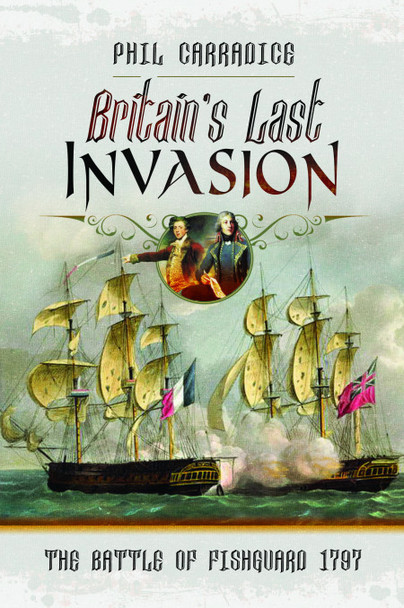Author Guest Post: Phil Carradice
The Last Invasion of Britain
Everybody knows the date 1066, don’t they? The date of the last invasion of Britain – except that it isn’t! The last time any invading army landed on British soil was actually 29 February 1797 when 1400 members of the French Legion Noire descended upon Fishguard in Pembrokeshire.
This real “Last Invasion” is now largely forgotten but at the time it terrified the British people who immediately ran for the hills. As they went they buried their valuables in their gardens.
The fleeing populace stopped to call in at their local bank and demand their money – paid out in gold and silver – which then joined their necklaces and pocket watches in the earth. It was pure unadulterated panic and it caused such a near-fatal run on the country’s financial institutions that the Bank of England almost ran out of money!
The “invasion,” which lasted just three days, was intended as diversionary raid to draw the attention of the Royal Navy away from the real target – southern Ireland. No-one was going to risk top quality troops on such an expedition and so the occupants of French jails were offered a choice – join the Legion Noire and fight or carry on kicking your heels in prison. Most of them took the option to fight.
The original Irish adventure foundered in the face of a severe gale in December 1796. Even so, the Directory – the ruling council of Revolutionary France – decided to launch the diversionary raid anyway. It was two months late but the newly released ruffians of the Legion Noire were causing serious problems in the taverns and on the streets of Brest. The idea of sending them to cause even more trouble in Britain had a decided appeal.
The original intention was to send the Legion Noire to Bristol. They were supposed to sack and burn the city but wind and tide were against them and so Plan B was put into operation. The invasion fleet turned around and headed for Fishguard instead.
The French believed that Wales was a hot bed of revolution and that was where the convicts were now aiming. As one wit later put it ‘The British send their convicts to New South Wales, the French send theirs to old south Wales.’
The Legion, under the command of Irish-American William Tate landed on the Pencaer Peninsula outside Fishguard on the night of 22 February 1797. They could have come ashore in Fishguard Bay but had been frightened off when a shot from the local fort caused them to heel around and head back along the coast. What the French did not know was that the shot had been a blank – the first in a long line of farcical events surrounding the invasion.
Despite the setback the half-starved convict-soldiers successfully landed across the rocks of Pencaer and then proceeded to eat all the wild life and farm animals they could catch. Much of it was eaten raw, some boiled up in vats of butter – with fairly obvious consequences.
As if that wasn’t enough, demon drink now also took a hand. A Portuguese coaster with a cargo of wine had been wrecked in the area only a few weeks before and the wine had been looted by the locals. The convicts promptly set about consuming this as well.
For two days the Legion Noire rolled in drunken ecstasy around northern Pembrokeshire. Tate and his officers could not control them and several were either captured by the Fishguard Fencibles – a nineteenth century version of Dad’s Army if ever there was one – or tipped unceremoniously into deep wells or over the cliffs.
It could not go on and Tate surrendered to Lord Cawdor, leader of the relieving army then marching northwards from Pembroke and Haverfordwest. Cawdor’s makeshift force of sailors, farmers and Pembrokeshire Yeomanry were surprised but jubilant at their “victory.”

Legends inevitably grew up around the affair. Lord Cawdor, it was said, persuaded the Welsh women in their red shawls and tall black hats to march around the headland and so convince the drunken Frenchmen that they were soldiers. Not true but it makes a great story.
The town cobbler, Jemima Nicholas marched out onto the Peninsula and, single handed, captured twelve Frenchmen. Now that is true. They were probably drunk but it was still bravery of the highest order.
The invasion had been a farce, from beginning to end, but several important results did emerge. The government quickly realised that Britain’s only real means of defence lay in her navy. As a result the ships of the Royal Navy were reinforced with new and immensely powerful vessels, creating a British Fleet that would decisively defeat the French and Spanish at Trafalgar and go on to “rule the waves” for over a hundred years.
Perhaps most importantly the Bank of England came perilously close to running out of the gold and silver it so cherished and was forced to suspend cash payments. It had happened before, during the Jacobite Rebellion of 1745 but this time the suspension was considerably longer lasting. Instead of coinage the Bank issued promissory notes for £1 and £2. The £1 note remained in use until the 1980s when it was finally superseded by the £1 coin.
The Bank of England did not resume cash payments for 20 years after 1797 but the paper notes soon became an indispensable part of British life. A Select Committee was called to examine the affairs of the Bank of England, their report showing that demands on the Bank’s resources on 25 February 1797 were £13,770,390. To meet these demands the Bank had funds of £17,597,280.
It had been a close thing and if the run on the Bank had continued the funds would have been soon eroded. The drunken Frenchmen, lying in their prison hulks across Britain, did not know how close they had come to success.

Britain’s Last Invasion is available to order here.

